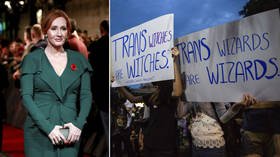I’ve read JK Rowling’s ‘transphobic’ new crime novel. I’m transgender & sensitive to such abuse - but there is NONE in this book

Calm down, all you JKR haters. Have you actually read her latest book? Troubled Blood is denigrated for featuring a ‘transvestite serial killer’, but it’s not about transgender people at all. It’s about male hatred of women.
Robert Galbraith’s Troubled Blood is a cracking read. Clocking in at an impressive 927 pages, it is also a lengthy read, which casts doubt on the veracity of much of the commentary that followed its publication last week.
Galbraith is, of course, a pseudonym of JK Rowling. She has been in hot water with transgender activists this summer after she reclaimed the word woman for her biological sex, and went on to defend women’s sex-based rights.
In any book of this length, there would have been something to excite her opponents, but her depiction of villain Dennis Creed set their alarm bells ringing. Creed follows in a long literary tradition of sadistic serial killers. Misogynist men who hate women so much they imprison, rape, torture and kill their victims in cold blood to satisfy their perverted sexual compulsions. It is grim reading, particularly because this genre of fiction reflects the dark side of humanity in sickening detail. Creed’s catalogue of crimes is set out coldly on pages 76 and 77, his modus operandi being to capture women and imprison them in his basement for his sadistic pleasure before murdering them and moving on to the next.
Also on rt.com Psycho dramas are all the rage: George Galloway defends JK Rowling and hits back at cancel cultureBut Creed aside, this is the fifth book in a series, which could be a barrier to new readers. Rowling, however, is a skilled writer who develops her characters carefully and this book can stand alone.
Rapidly, detective Cormoran Strike and his colleague Robin Ellacott are fleshed out. Their backstories are woven into the text as Rowling establishes the plot: the search for the killer of Margot Bamborough. Bamborough was a GP who disappeared on 11 October 1974. Years later her daughter tells Strike that nobody’s seen her since; investigators at the time thought that Creed was culpable but couldn’t prove it.
Whether the book needed to be so long is a matter for debate, but Rowling maintains just enough suspense to keep the pages turning.
However, the real story moved beyond the plot and character development when The Daily Telegraph reviewed the book last week. Creed was described as a transvestite serial killer by a reviewer who then speculated on the reaction of Rowling’s critics to a book, “whose moral seems to be: never trust a man in a dress.”
He might as well have thrown a match into a box of fireworks. Despite being hidden behind a paywall, that review sparked a Twitter hurricane. It’s hard to exaggerate the fury of the mob that was already gunning for Rowling. Within days the hashtag #RIPJKRowling trended on Twitter, attached to some of the most vile abuse imaginable. It was almost as if Dennis Creed was alive – not in JK Rowling’s words – but in the emotion of her opponents.
Haha #RIPJKRowlingpic.twitter.com/YAOmpGXifq
— Bex | WAP | BLM (@BeckySnowden92) September 15, 2020
The misogyny was palpable. A fraction was captured by UK columnist Andrew Doyle. His alter-ego Titania McGrath explained ironically, “We in the LGBTQIA+ community are ALWAYS compassionate and loving and committed to justice, peace and basic human decency.”
I still cannot believe JK Rowling has written a novel which implies that trans people can be villains. We in the LGBTQIA+ community are ALWAYS compassionate and loving and committed to justice, peace and basic human decency. #BeKind#LoveWins#RIPJKRowlingpic.twitter.com/H2OnMVWoex
— Titania McGrath (@TitaniaMcGrath) September 15, 2020
Others called for her books to be burned. Videos proliferated across the internet
In sombre tones the voice over announced, “The positive impact that J.K. Rowling's work had on millions of readers does not negate how her hateful lobbying has affected the trans community.”
Even minor celebrities rolled up their sleeves.
Does anyone need firewood this winter! JK’s new book is perfect to burn next to a Romantic fire 🔥 Aww get all cozy and comfy can’t wait 😊
— JEDWARD (@planetjedward) September 15, 2020
How many among the outraged masses had actually read the book is unclear, but their accusations are nonsense. There are no trans characters in the book, no transphobia and nothing that could be construed as negative towards trans people. As a transgender person, I am sensitive to transphobic abuse, but there was nothing to see here.
But that did not stop supposedly respectable media outlets peddling alternative facts. Vanity Fair headlined with “J.K. Rowling Proves Her Commitment to Transphobia in Her New Novel”, relying entirely on the Telegraph review. Forbes hadn’t read the book either. After taking one sentence from the book’s page on Amazon.com, they merely reported social media outrage. We are in disturbing times when the agenda is driven by the outraged hordes on Twitter.
However, the truth is out there and it’s in the book that is available from most good booksellers. I say most because, according to the Mirror, at least one bookstore in Australia will no longer stock JK Rowling novels and will “phase out” the copies of Harry Potter they currently have in store. They explained that this move was intended to help them become a “safer space” for the community.
A community that needs to be protected from books is a community with a problem. If you want to comment on a book, you need to read it, and not rely on the rumour and gossip.
Also on rt.com As a trans woman, parent and teacher, I say JK Rowling is absolutely right; it’s child abuse to push kids towards changing sexThe accusations of transphobia appear to stem from a single reference on page 75, where Creed is pictured in the historic testimony of a woman who had escaped from his clutches. Peggy Hiskett describes Creed as “dark and stocky, because he was wearing a wig at the time and all padded out in a woman’s coat.”
That’s it! There wasn’t even a dress. Whether he used it as a disguise or merely a means to lower the guard of his victim, Creed is not a transgender woman. Years later, When Strike interviews Creed himself – on page 854 - Creed suggests, “in a wig, bit of lipstick … they think you’re harmless, odd … maybe queer.”
On page 80 we learn that, as an adolescent, Creed pleasured himself after stealing women’s underwear from neighbours’ washing lines. But he was also taken to voyeurism and in his own words, “I was aroused not only by the obviously sensual aspects, but by the sense of power.”
This is not a book about transgender people at all but the male oppression of women. Rowling – a domestic abuse survivor herself – created a malevolent character to describe, in sickening detail, the depths of the human mind and what abusive men can do to women.
But rather than praise her for her extensive research, or her ability to tell a cracking story, or for raising the problem of male violence in a society that too often shrugs indifferently, the mob heard what they wanted to hear. Rowling was swiftly tried and convicted of transphobia on all counts.
Violent threats aside, this extraordinary publicity does not appear to have harmed Rowling’s success. Troubled Blood went straight to the UK Official Top 50 number one spot, selling more than 64,000 copies in its first week. According to The Bookseller, this is by far the biggest single week of sales for any Galbraith title. This is a book people are buying, and it is a book worth reading.
Like this story? Share it with a friend!
The statements, views and opinions expressed in this column are solely those of the author and do not necessarily represent those of RT.














